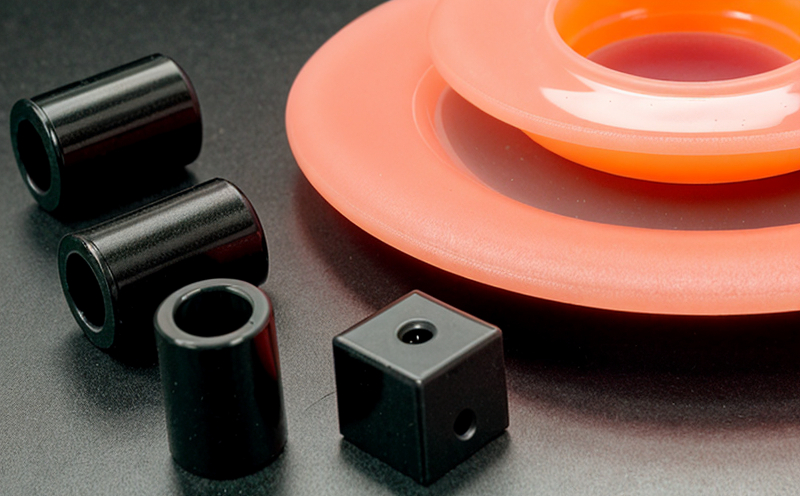IEC 60068-2-1 Cold Resistance Testing of Plastic Sports Devices
The IEC 60068-2-1 standard outlines the cold resistance test method for plastic materials. This service is critical in ensuring that sports devices made from plastics meet the required specifications to withstand low temperatures without compromising performance or safety. Compliance with this standard ensures that manufacturers can produce products that are reliable and safe under a wide range of environmental conditions.
The testing process involves subjecting specimens of plastic sports equipment, such as skis, snowboards, or helmets, to controlled cold environments for specific durations. The primary objective is to assess the mechanical properties, dimensional stability, and chemical resistance of these plastics at low temperatures. This service is essential for brands that operate in diverse climates, especially those targeting regions with fluctuating temperature conditions.
Preparation of specimens is a crucial step before testing. Specimens must be prepared according to the standard's requirements, which typically involve cutting or shaping the plastic into specific dimensions and ensuring they are free from defects. The test setup includes a cold chamber that can maintain temperatures as low as -40°C for extended periods.
The testing process itself involves placing specimens in the cold chamber at specified temperatures and durations. During this time, mechanical properties such as tensile strength, flexural modulus, and impact resistance are measured using appropriate instruments like universal testers or impact testers. The results are compared against predefined acceptance criteria to determine compliance with IEC 60068-2-1.
Post-test analysis is conducted to evaluate any changes in material properties due to the cold exposure. This includes visual inspections for cracks, discoloration, or other signs of degradation. Additionally, dimensional stability tests are performed to ensure that the specimens maintain their original dimensions after testing.
Reporting and certification play a vital role in this service. Detailed reports are generated summarizing all test parameters, results, and comparisons against acceptance criteria. These reports serve as valuable tools for quality management and compliance officers to make informed decisions regarding product development and procurement.
The importance of this service cannot be overstated, especially given the increasing demand for durable and reliable sports equipment in various geographical locations. By adhering to international standards like IEC 60068-2-1, manufacturers can ensure their products meet global quality and safety expectations.
- Preparation: Cutting or shaping specimens according to standard requirements.
- Testing: Placing specimens in cold chambers for specified durations at various temperatures.
Quality and Reliability Assurance
The quality and reliability of plastic sports devices are paramount, especially considering the demanding environments they operate in. Our laboratory employs rigorous testing protocols to ensure that every product meets stringent IEC 60068-2-1 standards. This involves not only cold resistance tests but also a comprehensive suite of mechanical property evaluations.
- Mechanical Property Evaluations: Tensile strength, flexural modulus, impact resistance, and more.
- Dimensional Stability Tests: Ensuring specimens maintain their original dimensions after cold exposure.
Our team of expert engineers and technicians meticulously prepares each specimen, ensuring it adheres to the exact specifications outlined in IEC 60068-2-1. This precision guarantees accurate and reliable test results. Post-test analysis is thorough, with detailed reports providing insights into any changes in material properties due to cold exposure.
Quality assurance extends beyond testing; it encompasses continuous improvement processes aimed at enhancing product reliability. Our commitment to excellence ensures that every batch of plastic sports devices meets the highest standards, thereby safeguarding user safety and satisfaction.
International Acceptance and Recognition
The IEC 60068-2-1 standard is widely recognized globally for its stringent requirements in assessing cold resistance of plastic materials. Compliance with this standard is mandatory for many international markets, ensuring that products are not only safe but also reliable under diverse climatic conditions.
Our laboratory's expertise in IEC 60068-2-1 testing aligns perfectly with global standards and regulations. We ensure that every test conducted adheres strictly to the specified parameters outlined by this international standard. This alignment not only enhances product quality but also facilitates easier market entry for manufacturers.
By choosing our laboratory, clients can gain access to a network of trusted partners worldwide who understand the importance of meeting these standards. This recognition and acceptance contribute significantly to brand reputation and customer trust, making it an invaluable service in today's competitive landscape.
Use Cases and Application Examples
The IEC 60068-2-1 cold resistance testing is particularly vital for manufacturers of plastic sports devices designed for use in cold climates. For instance, ski manufacturers must ensure that their products can withstand extreme temperatures without compromising performance or safety.
- Ski Manufacturers: Ensuring that skis maintain their integrity and function optimally even in freezing conditions.
- Helmet Manufacturers: Guaranteeing helmets are robust enough to protect users from impacts regardless of temperature fluctuations.
In addition to these primary applications, the testing also benefits manufacturers of other plastic sports equipment like snowboards, ice skates, and protective gear. By adhering to IEC 60068-2-1 standards, these companies can ensure their products are not only innovative but also safe for use in a wide range of environments.
Our laboratory's expertise in this area has helped numerous clients achieve compliance with international standards, thereby opening doors to new markets. This service is essential for any company aiming to maintain high-quality standards and gain competitive advantage through reliable testing.





